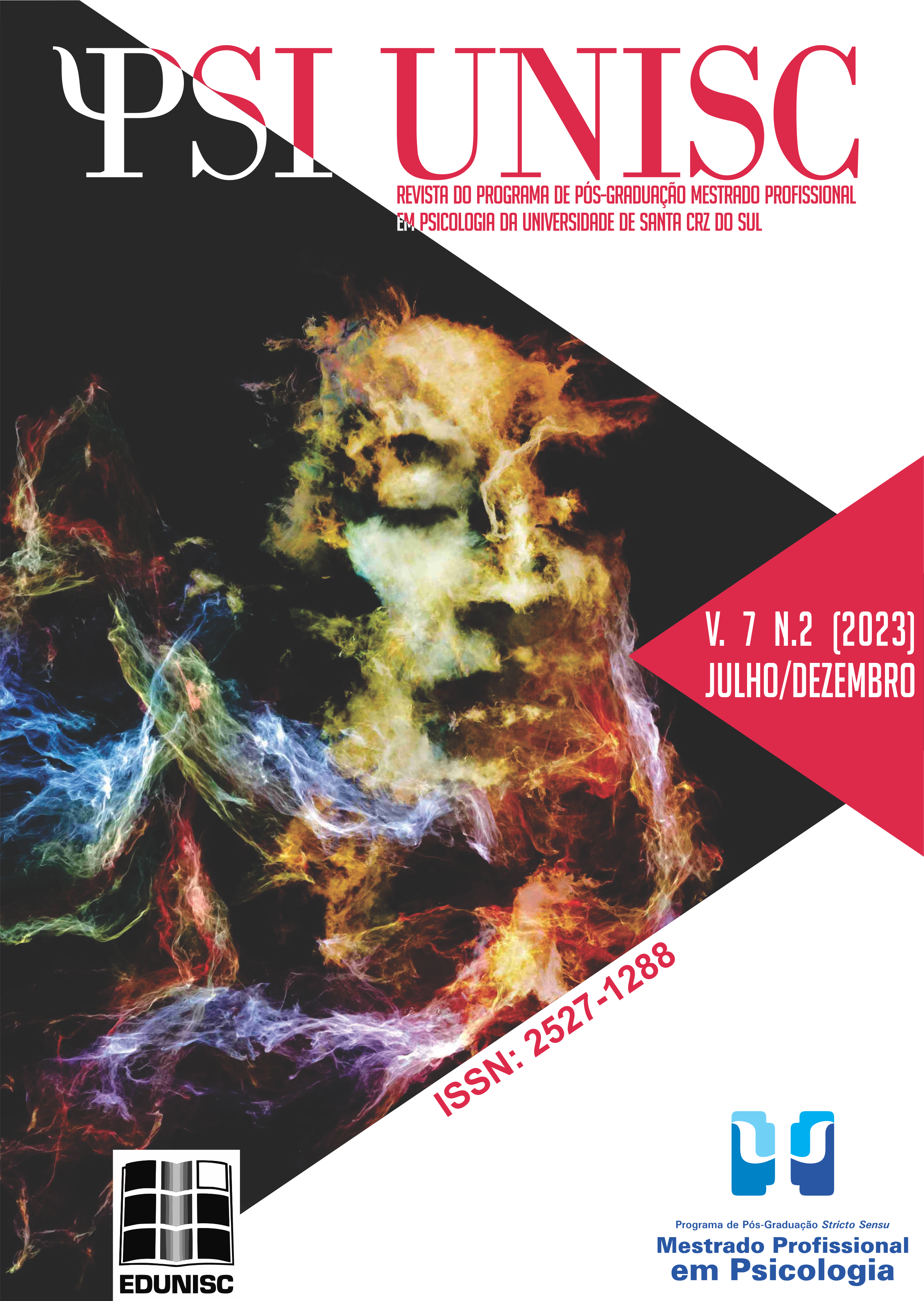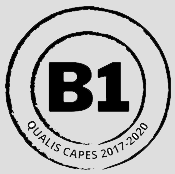The graduation in medicine and the Integrative and Complementary Practices in Health
DOI:
https://doi.org/10.17058/psiunisc.v7i2.17852Keywords:
Medical student, Integrative and complementary practices in health (ICPH), ReportAbstract
The academic experience of medical students, although it brings a lot of technical and practical knowledge to students, it’s full of difficulty, challenges and complexity. Therefore, many students try to find ways to slow down this trajectory through strategies that include the exercise of practices for self-care. Integrative and Complementary Practices in Health (ICPH) can become allies during this period. This text deals with an experience report where a medical student describes and analyzes her experiences with ICPH during the academic training process, in the period between 2019 and 2021. A scientific narrative in self-narrative form, in which the writer analyzes the events based on their importance and impact on their trajectory. The objective of this text is to understand the impact and relationship of ICPH with a medical student in training, in order to also assimilate the importance of these practices in her physical and mental health. Based on this work, it was possible to understand the relationship between these practices and the academic training of a medical student, which is historically marked by great psychic cost.
Downloads
References
Afonso, D. H., Postal, E. A., Batista, N. A., & Oliveira, S. S. (2020). A escola médica na pandemia da Covid-19. Brasília: ABEM, 2020.
Ameade, E. P. K., Amalba, A., Helegbe, G. K., & Mohammed, B. S. (2016). Medical students’ knowledge and attitude towards complementary and alternative medicine - A survey in Ghana. Journal of Traditional and Complementary Medicine, 6(3), 230–236. https://doi.org/10.1016/j.jtcme.2015.03.004
Barretto, B. P., & Maurício, A. F. (2022). Isolamento social, ensino à distância e seus impactos no estudante universitário durante a pandemia de Covid-19. Brazilian Journal of Health Review, 5(2), 4506–4524. https://doi.org/10.34119/bjhrv5n2-042
Brasil (2018). Práticas Integrativas e Complementares em Saúde Práticas Integrativas e Complementares em Saúde. Brasília: Ministério da Saúde.
Brasil (2015). Política Nacional de Práticas Integrativas e Complementares no SUS (2a edição). Brasília: Ministério da Saúde.
Brasil (2005). Política Nacional de Medicina Natural e Práticas Complementares PMNPC. Brasília: Ministério da Saúde.
Castro, M. M. C., Daltro, C., Santos, L. M., & Daltro, M. R. (2022). Impacts of the Covid-19 andemic on higher education students in Bahia / Impactos da pandemia do Covid-19 nos estudantes de ensino superior na Bahia. Brazilian Journal of Development, 8(5), 40304–40316. https://doi.org/10.34117/bjdv8n5-491
Conceição, L. de S., Batista, C. B., Dâmaso, J. G. B., Pereira, B. S., Carniele, R. C., & Pereira, G. dos S. (2019). Saúde mental dos estudantes de medicina brasileiros: uma revisão sistemática da literatura. Avaliação: Revista da Avaliação da Educação Superior (campinas), 24(3), 785–802. https://doi.org/10.1590/S1414-40772019000300012
Daltro, M. R., & Faria, A. A. (2019). Relato de experiência: Uma narrativa científica na pós-modernidade. Estudos e Pesquisas em Psicologia, 19(1), 223–237. https://doi.org/10.12957/epp.2019.43015
Dias, A.P. S., Felizzola, B. P., Lima, J. C. M., Uliana, M. B., Marangoni, P. A., & Bonini, L. M. M. (2020). Saúde Mental de Adolescentes e Jovens que se Preparam para Cursos de Medicina: Um Estudo de Caso em São Paulo, Brasil. Revista Humanidades e Inovação, 7(5), 310-315. Recuperado de https://revista.unitins.br/index.php/humanidadeseinovacao/article/view/2687
Gundim, V. A., Encarnação, J. P., Santos, F. C., Santos, J. E., Vasconcellos, E. A., & Souza, R. C. (2020). Saúde mental de estudantes universitários durante a pandemia de covid-19. Revista Baiana de Enfermagem, 35. https://doi.org/10.18471/rbe.v35.37293
Halperin, S. J., Henderson, M. N., Prenner, S., & Grauer, J. N. (2021). Prevalence of Anxiety and Depression Among Medical Students During the Covid-19 Pandemic: A Cross-Sectional Study. Journal of Medical Education and Curricular Development, 8, 238212052199115. https://doi.org/10.1177/2382120521991150
Hankir, A. K., Northall, A., & Zaman, R. (2014). Stigma and mental health challenges in medical students. BMJ Case Reports, 1–5. https://doi.org/10.1136/bcr-2014-205226
Helena, D., Terra, P., I, G. A. V., Maria, A., Dias, D., Ii, C., Souza, F. De, T., & Riboli, G. E. (2013). Ansiedade e Depressão em Vestibulandos Anxiety and Depression in students. Recife. 12(4), 273–276.
Herpreet, T., Joseph, L. F., Kate, M. G., Laura, S., Geetha, G., Marie, S., Naama, G., & Beth, C. B. (2018). Yoga as a complementary therapy for patients with type 2 diabetes. Physiology & Behavior, 66(4), 693–698. https://doi.org/10.17761/2018-00026.Yoga
Köhler, F., Martin, Z. S., Hertrampf, R. S., Gäbel, C., Kessler, J., Ditzen, B., & Warth, M. (2020). Music therapy in the psychosocial treatment of adult cancer patients: A systematic review and meta-analysis. Frontiers in Psychology, 11(April), 1–15. https://doi.org/10.3389/fpsyg.2020.00651
Kreitzer, M. J., Mitten, D., Harris, I., & Shandeling, J. (2002). Attitudes toward CAM among medical, nursing, and pharmacy faculty and students: a comparative analysis. Alternative Therapies in Health and Medicine, 8(6), 44-47,50-53.
Lam, H. L., Li, W. T. V., Laher, I., & Wong, R. Y. (2020). Effects of music therapy on patients with dementia-A systematic review. Geriatrics (Switzerland), 5(3), 1–14. https://doi.org/10.3390/GERIATRICS5040062
Li, Y., Wang, A., Wu, Y., Han, N., & Huang, H. (2021). Impact of the COVID-19 Pandemic on the Mental Health of College Students: A Systematic Review and Meta-Analysis. Frontiers in Psychology, 12(July), 1–14. https://doi.org/10.3389/fpsyg.2021.669119
Lundt, A., & Jentschke, E. (2019). Long-Term Changes of Symptoms of Anxiety, Depression, and Fatigue in Cancer Patients 6 Months After the End of Yoga Therapy. Integrative Cancer Therapies, 18. https://doi.org/10.1177/1534735418822096
Ma, Z., Zhao, J., Li, Y., Chen, D., Wang, T., Zhang, Z., Chen, Z., Yu, Q., Jiang, J., Fan, F., & Liu, X. (2020). Mental health problems and correlates among 746 217 college students during the coronavirus disease 2019 outbreak in China. Epidemiology and Psychiatric Sciences. https://doi.org/10.1017/S2045796020000931
Macedo, J. C. (2020). Ensino das Práticas Integrativas e Complementares nos cursos de enfermagem do Estado de São Paulo. Revista Nursing, 23(2), 4392–4396.
Marques, V. M., & Satriano, C. S (2017). Narrativa Autobiográfica do Próprio Pesquisador como Fonte e Ferramenta de Pesquisa (volume 23). Brasília, Brasil.
Marsilli, L. R. B., Smecellato, F. B., & De Castro E Silva, O. (2020). Medical education in COVID-19 pandemic: Medical students’ point of view. Medicina (Ribeirão Preto, Brazil), 53(4), 490–494. https://doi.org/10.11606/ISSN.2176-7262.V53I4P490-494
Mayer-Benarous, H., Benarous, X., Vonthron, F., & Cohen, D. (2021). Music Therapy for Children With Autistic Spectrum Disorder and/or Other Neurodevelopmental Disorders: A Systematic Review. Frontiers in Psychiatry, 12(April). https://doi.org/10.3389/fpsyt.2021.643234
Meleiro, A. M. A. S. (1998). Suicídio entre médicos e estudantes de medicina. Revista da Associação Médica Brasileira, 44(2), 135–140. https://doi.org/10.1590/S0104-42301998000200012
Mishra, L., Singh, B. B., & Dagenais, S. (2001). Ayurveda: a historical perspective and principles of the traditional healthcare system in India. Alternative therapies in health and medicine, 7(2), 36–42. Recuperado de https://pubmed.ncbi.nlm.nih.gov/11253415/
Pera, G. (10 jun. 2019.). Portal MEC. Número de candidatos sobe 25,9% e o de inscrições cresce 24,3% em relação a 2018. Recuperado de http://portal.mec.gov.br/busca-geral/410-noticias/sisu-535874847/77021-numero-de-candidatos-sobe-25-9-e-o-de-inscricoes-cresce-24-3-em-relacao-a-2018
Rodrigues, B. B., Cardoso, R. R. de J., Peres, C. H. R., & Marques, F. F. (2020). Aprendendo com o Imprevisível: Saúde Mental dos Universitários e Educação Médica na Pandemia de Covid-19. Revista Brasileira de Educação Médica, 44(suppl 1), 8–12. https://doi.org/10.1590/1981-5271v44.supl.1-20200404
Salles, L. F., Homo, R. F. B., & Silva, M. J. P. (2014). The situation of the teaching of holistic and complementary practices in undergraduate courses in nursing, physiotherapy and medicine. Cogitare Enfermagem, 19(4), 682–687.
Son, C., Hegde, S., Smith, A., Wang, X., & Sasangohar, F. (2020). Effects of COVID-19 on College Students’ Mental Health in the United States: Interview Survey Study. Journal of Medical Internet Research, 22(9), e21279. https://doi.org/10.2196/21279
Teixeira, N., Maria, A., Catrib, F., Filice, N., Barros, D., Pinheiro, G., ... Abdon, V. (2021). Complementary Therapies in Medicine Complementary and Integrative Medicine in academic health education ☆. Complementary Therapies in Medicine, 63, 102785. https://doi.org/10.1016/j.ctim.2021.102785
Thomas, M., & Bigatti, S. (2020). Perfectionism, impostor phenomenon, and mental health in medicine: a literature review. International Journal of Medical Education, 11, 201–213. https://doi.org/10.5116/ijme.5f54.c8f8
Tiralongo, E., Wallis, M. (2008). Attitudes and perceptions of Australian pharmacy students towards Complementary and Alternative Medicine – a pilot study. BMC Complement Altern Med, 8(2). https://doi.org/10.1186/1472-6882-8-2
Van Hal, M., Dydyk, A. M. & Green, M. S. (25 jul. 2022). Acupuncture. Treasure Island (FL): StatPearls Publishing. Recuperado de https://www.ncbi.nlm.nih.gov/books/NBK532287/
Veal, C. T. (2021). We Burn Out, We Break, We Die: Medical Schools Must Change Their Culture to Preserve Medical Student Mental Health. Academic Medicine, 96(5), 629–631. https://doi.org/10.1097/ACM.0000000000003991
Walker, B. F., Armson, A., Hodgetts, C., Jacques, A., Chin, F. E., Kow, G., ... Wright, A. (2017). Knowledge, attitude, influences and use of complementary and alternative medicine (CAM) among chiropractic and nursing students. Chiropractic & Manual Therapies, 25(29). https://doi.org/10.1186/s12998-017-0160-0
Wang, S., & Agius, M. (2018). The use of music therapy in the treatment of mental illness and the enhancement of societal wellbeing. Psychiatria Danubina, 30, S595–S600.
Wen, J., Chen, X., Yang, Y., Liu, J., Li, E., Liu, J., ... & He, K. (2021). Acupuncture Medical Therapy and its Underlying Mechanisms: A Systematic Review. The American Journal of Chinese Medicine, 49(1), 1–23. https://doi.org/10.1142/S0192415X21500014
Wu, S. G., He, L., Wang, Q., & Tang, Y. J. (2015). An ancient Chinese wisdom for metabolic engineering: Yin-Yang. Microbial Cell Factories, 14(1), 1–9. https://doi.org/10.1186/s12934-015-0219-3
Wu, Y., Johnson, B. T., Acabchuk, R. L., Chen, S., Lewis, H. K., Livingston, J., ... Pescatello, L. S. (2019). Yoga as Antihypertensive Lifestyle Therapy: A Systematic Review and Meta-analysis. Mayo Clinic Proceedings, 94(3), 432–446. https://doi.org/10.1016/j.mayocp.2018.09.023
Xiong, W., He, F.-F., You, R.-Y., Xiong, J., Wang, Y.-M., Zhang, C., ... & Su, H. (2018). Acupuncture Application in Chronic Kidney Disease and its Potential Mechanisms. The American Journal of Chinese Medicine, 46(6), 1169–1185. https://doi.org/10.1142/S0192415X18500611
Yang, J., Chen, J., Yang, M., Yu, S., Ying, L., Liu, G. J. ... Liang, F. R. (2018). Acupuncture for hypertension. Cochrane Database of Systematic Reviews,11, 1465-1858. https://doi.org/10.1002/14651858.CD008821.pub2
Yildirim, Y., Parlar, S., Eyigor, S., Sertoz, O. O., Eyigor, C., Fadiloglu, C., & Uyar, M. (2010). An analysis of nursing and medical students’ attitudes towards and knowledge of complementary and alternative medicine (CAM). Journal of Clinical Nursing, 19(7–8), 1157–1166. https://doi.org/10.1111/j.1365-2702.2009.03188.x
Zhu, F., Zhang, M., Wang, D., Hong, Q., Zeng, C., & Chen, W. (2020). Yoga compared to non-exercise or physical therapy exercise on pain, disability, and quality of life for patients with chronic low back pain: A systematic review and meta-analysis of randomized controlled trials. PloS One, 15(9), e0238544. https://doi.org/10.1371/journal.pone.0238544
Downloads
Published
How to Cite
Issue
Section
License
The submission of originals to this journal implies the transfer, by the authors, of the printed and digital publication rights. The copyrights for the published articles are those of the author, with periodical rights on the first publication. Authors may only use the same results in other publications clearly indicating this journal as the medium of the original publication. Because we are an open access journal, we allow free use of articles in educational and scientific applications provided the source is cited under the Creative Commons CC-BY license.




